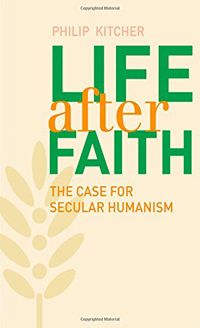 Philip Kitcher, Life After Faith; The Case for Secular Humanism (New Haven: Yale University Press, 2014), 175pp.
Philip Kitcher, Life After Faith; The Case for Secular Humanism (New Haven: Yale University Press, 2014), 175pp.
In this slender but technical volume that ranges from Kant and Kierkegaard to William James and Ludwig Wittgenstein, Philip Kitcher, the John Dewey Professor of Philosophy at Columbia University, argues for what he calls "soft atheism." This is a little misleading, because he does not commend a more cautious or modest agnosticism. Rather, he favors "active disbelief" and a "blunt denial" of religion, faith, mystery, and the transcendent. In his view, "acceptance of the transcendent is a wild leap: belief is simply speculative conjecture." In one place, he admits the "bare possibility" that there might be a transcendent, but he otherwise rejects all religions as "thoroughly false."
If God does not exist, then are ethical values unhinged and everything permissible? He argues to the contrary. Is immortality necessary to have meaning in life or after death? No, eternal life sounds "tedious and burdensome." Similarly, in another chapter he argues that a thoroughly secular life can have depth, and does not necessarily lead to depravity.
Kitcher is refreshing because he repudiates the contempt for religion in atheists like Dawkins, Dennett, Harris, and Hitchens. He does not view religion as necessarily harmful, "noxious rubbish" to be buried as quickly as possible, even though in his view it is intellectually false. He even admits that believers probably do a better job of creating community for meaningful lives than their secular counterparts.
In his introduction, Kitcher remembers with fondness his boarding school days when he went to church eight days a week and sang in the boys choir. He affirms that there are valuable aspects to religion, and not just in the aesthetic appeal of its music, art and architecture, but rather in "the ways in which belonging to a religious community transformed the lives of people I knew well in childhood." Indeed, "the atheist movement today often seems blind to the apparently irreplaceable roles religion and religious community play in millions, if not billions, of lives." Kitcher's aim is to show how an atheistic life can fulfill those same valuable roles that the falsehoods of faith have for almost all people of all time, and in every place.


